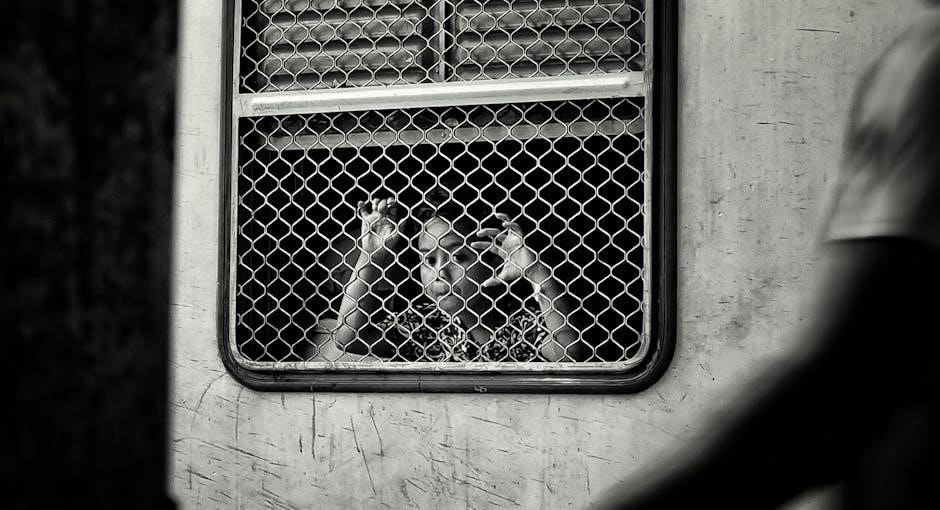Against the Loveless World by Susan Abulhawa is a powerful 2020 novel exploring the Palestinian experience through Nahr’s journey of identity, love, resistance, and resilience amidst political turmoil․
Overview of the Book
Against the Loveless World by Susan Abulhawa is a poignant and lyrical novel that follows the journey of Nahr, a Palestinian refugee, as she navigates a life shaped by displacement, radicalization, and resilience․ Born in Kuwait in the 1970s to Palestinian refugees, Nahr’s story unfolds across multiple countries, including Kuwait, Iraq, Jordan, and Palestine, reflecting the broader Palestinian experience of exile and struggle․ The novel is structured in sections, with Nahr recounting her life from solitary confinement, where she reflects on shattered dreams, unrequited love, and her quest for survival․ Abulhawa’s vivid prose and emotional depth bring to life the complexities of identity, resistance, and the enduring power of love in the face of oppression․
Author Background: Susan Abulhawa
Susan Abulhawa is a Palestinian-American author and political activist, best known for her impactful novels that delve into the Palestinian experience․ Born to Palestinian refugees, her work is deeply rooted in the struggles and resilience of her community․ Abulhawa is the founder of Playgrounds for Palestine, a non-governmental organization dedicated to providing children with access to play․ Her debut novel, Mornings in Jenin, was widely acclaimed and translated into thirty languages․ Her subsequent works, including The Blue Between Sky and Water and Against the Loveless World, have solidified her reputation as a powerful voice in contemporary literature, blending lyrical prose with unflinching political commentary․ Abulhawa resides in Pennsylvania, where she continues to advocate for Palestinian rights and cultural preservation․ Her writing not only tells stories of displacement and resistance but also highlights the enduring strength of love and identity in the face of adversity․
Historical and Political Context
Against the Loveless World is set against the backdrop of the Israeli-Palestinian conflict, exploring themes of displacement, occupation, and resistance․ The novel delves into the historical struggles of Palestinians, particularly their expulsion and statelessness following the creation of Israel․ Susan Abulhawa vividly portrays the impact of political turmoil on individual lives, highlighting the resilience of Palestinian refugees․ The story reflects the broader historical context of settler-colonial oppression and the enduring fight for Palestinian rights․ By weaving personal narratives with political realities, Abulhawa challenges dominant Western perspectives, offering a deeply humanizing account of life under occupation․ The novel underscores the intersection of history, politics, and personal identity, making it a powerful commentary on one of the world’s most enduring conflicts․
Main Characters and Protagonist
Nahr, a resilient Palestinian refugee, is the protagonist․ The novel’s non-linear narrative explores her life alongside other key figures, Billal and Yasser, delving into their emotional depth and struggles․
Nahr: The Central Character
Nahr, a young Palestinian refugee, is the heart of Against the Loveless World․ Born in 1970s Kuwait to displaced parents, her life is marked by displacement, radicalization, and resilience․ Nahr’s story unfolds in solitary confinement, where she reflects on her turbulent past, from shattered dreams of love and family to her relentless fight for survival․ Her narrative voice, both poignant and raw, reveals a complex woman grappling with identity, belonging, and resistance․ Through her journey, Abulhawa humanizes the Palestinian struggle, crafting Nahr as a symbol of resilience and the unyielding quest for dignity in the face of oppression․ Her story is a testament to the strength of the human spirit․
Supporting Characters and Their Roles

Klara, a Russian-Israeli guard, forms an unexpected bond with Nahr, offering rare moments of humanity in her isolation․ Their connection highlights the complexities of empathy across adversary lines․ Bilal, a man Nahr meets in Palestine, represents her quest for love and identity, embodying the fragility of human connections․ These characters, though secondary, play pivotal roles in shaping Nahr’s journey, reflecting the broader themes of resilience, identity, and the struggle for dignity․ Each character adds depth to the narrative, illustrating the multifaceted nature of human experience under oppression․ Their stories intertwine with Nahr’s, creating a rich tapestry of hope, loss, and survival․
Character Development and Motivations
Nahr’s character evolves through her reflections in solitary confinement, revealing a complex interplay of love, loss, and resilience․ Her motivations stem from a quest for identity and belonging, shaped by her displacement and personal betrayals․ Abulhawa masterfully traces Nahr’s journey, from her dreams of a stable life to her radicalization, illustrating how external forces and inner desires collide․ The novel delves into her emotional depth, exposing vulnerabilities and strengths that define her survival․ Through flashbacks and introspection, Nahr’s character emerges as a symbol of resistance, driven by a relentless pursuit of dignity and justice․ Her story is both deeply personal and universally relatable, capturing the essence of human resilience in the face of oppression․

Themes and Motifs
Against the Loveless World explores themes of love, resilience, and identity, weaving motifs of radicalization, survival, and resistance to oppression, reflecting the Palestinian struggle and human endurance․
Love and Resilience
In Against the Loveless World, love emerges as both a source of strength and vulnerability․ Nahr’s journey, marked by heartbreak and betrayal, underscores resilience as a means of survival․ Her enduring capacity to love, despite the harsh realities of displacement and oppression, highlights the transformative power of human connection․ Through her story, Abulhawa illustrates how love transcends personal pain and becomes a collective resistance against systemic injustice․ The novel portrays love not as an escape, but as a fierce commitment to humanity amidst overwhelming adversity, making it a testament to the indomitable spirit of those fighting for their rights and identity․
Identity and Belonging
Nahr’s journey in Against the Loveless World is deeply intertwined with her struggle to reconcile her Palestinian identity and sense of belonging․ Born in Kuwait to refugee parents, Nahr’s displacement reflects the broader Palestinian experience of statelessness and cultural dislocation․ Abulhawa masterfully explores how Nahr’s identity is shaped by her heritage, her displacement, and her quest for a homeland․ The novel delves into the tension between her cultural roots and her physical presence in foreign lands, highlighting the fragmented nature of her existence․ Through Nahr’s narrative, Abulhawa underscores the universal human desire for belonging and the resilience required to maintain one’s identity in the face of erasure and oppression․
Resistance and Survival
Against the Loveless World vividly portrays Nahr’s journey as a testament to resistance and survival․ Her experiences of displacement, radicalization, and confinement underscore the resilience of the Palestinian spirit․ The novel highlights how Nahr’s acts of defiance, whether through silent resistance in solitary confinement or her unwavering commitment to her people, serve as a form of survival․ Abulhawa illustrates the physical and emotional toll of oppression while also celebrating the strength found in community and memory․ Nahr’s story is not just a personal struggle but a collective one, reflecting the broader Palestinian narrative of enduring hardship with dignity and hope․

Narrative Style and Structure
Against the Loveless World employs a non-linear narrative, weaving past and present through vivid flashbacks․ This structure deepens the emotional impact, highlighting Nahr’s resilience and inner conflict․
Nonlinear Storytelling
The novel employs a non-linear narrative, blending past and present through Nahr’s reflections in solitary confinement․ This structure builds tension and emotional depth, as fragments of her life unfold․ The storytelling shifts seamlessly between her childhood in Kuwait, her radicalization, and her eventual imprisonment․ Through flashbacks, Abulhawa masterfully connects Nahr’s personal struggles with the broader Palestinian experience, creating a poignant exploration of identity and resilience․ The non-linear style engages readers by gradually revealing the complexities of Nahr’s journey, making her story both deeply personal and universally relatable․ This narrative approach underscores the fragmented nature of displacement and the enduring power of love amidst adversity․
Use of Flashbacks
Flashbacks in Against the Loveless World are integral to the narrative, allowing Nahr to reflect on her past while in solitary confinement․ These memories reveal her journey from Kuwait to Palestine, highlighting her radicalization, personal losses, and resilience․ The flashbacks provide emotional depth, connecting Nahr’s personal story to the broader Palestinian struggle․ By weaving these recollections into the present, Abulhawa creates a layered narrative that humanizes Nahr’s complexities․ The use of flashbacks also underscores the fragmented nature of her identity, shaped by displacement and trauma; This technique allows readers to empathize with Nahr’s choices and understand her motivations, making her a deeply relatable and tragic figure․ The flashbacks enhance the novel’s emotional impact and thematic resonance․
Symbolism in the Narrative
Against the Loveless World employs rich symbolism to convey themes of resilience, identity, and oppression․ The “Cube,” Nahr’s solitary confinement cell, symbolizes both physical and emotional entrapment, reflecting the broader Palestinian experience under occupation․ Nahr’s journey from Kuwait to Palestine mirrors the diaspora’s displacement and search for belonging․ The recurring motif of blue whales represents freedom and vulnerability, contrasting with Nahr’s confined reality․ These symbols weave together to highlight the clash between hope and oppression, emphasizing the enduring spirit of resistance․ Through these elements, Abulhawa crafts a narrative that transcends individual suffering, speaking to universal themes of resilience and survival․ The symbolism deepens the emotional and political layers of the story․

Reception and Reviews
Against the Loveless World has received widespread critical acclaim for its emotional depth and political relevance․ Readers and critics praise its unflinching portrayal of resilience and resistance․
Critical Acclaim and Awards
Against the Loveless World has garnered significant critical acclaim for its emotional depth and unflinching portrayal of the Palestinian experience․ Critics have praised Susan Abulhawa’s lyrical prose and her ability to weave a story that is both deeply personal and politically charged․ The novel has been hailed as a masterpiece of contemporary literature, earning comparisons to works by authors like Khaled Hosseini․ While specific awards information is limited, the book’s impact lies in its ability to spark essential conversations about identity, resilience, and justice․ Readers and reviewers alike have commended its raw honesty and emotional weight, making it a standout in modern literary fiction․
Reader Responses and Impact
Readers have embraced Against the Loveless World for its raw emotional power and unflinching portrayal of the Palestinian struggle․ Many describe the novel as haunting yet hopeful, resonating deeply with its exploration of identity and resilience․ The book has sparked meaningful conversations about justice, love, and survival, particularly among those seeking to understand the Palestinian experience․ Its impact extends beyond literature, fostering empathy and raising awareness about systemic oppression․ Readers often highlight Nahr’s journey as a testament to the human spirit, making the novel a cherished and thought-provoking read․ Its ability to connect personal stories to broader political realities has left a lasting impression on audiences worldwide․
Comparisons with Other Works
Against the Loveless World has drawn comparisons to works by Khaled Hosseini and Nadia Mahjouri, praised for its emotional depth and cultural insight․ Like Hosseini’s novels, it masterfully blends personal narratives with broader political themes, creating a relatable yet expansive story․ The novel’s focus on resilience and identity aligns it with other contemporary works addressing displacement and conflict․ Readers familiar with Abulhawa’s earlier works, such as Mornings in Jenin, note a deeper exploration of trauma and hope in this latest novel․ Its unique storytelling approach and vivid character development set it apart, while its themes resonate with fans of literature that highlights the human condition amidst global struggles․

Psychological and Cultural Insights

The novel offers profound psychological insights into Nahr’s trauma and resilience, while culturally highlighting the Palestinian struggle for identity and belonging amidst displacement and oppression․
Psychological Depth of Characters

Nahr’s psychological journey is deeply explored, revealing her trauma, resilience, and radicalization․ Her emotional struggles and inner conflicts are portrayed with raw honesty, showcasing her complexity․ Supporting characters like Bilal and Klara add layers to the narrative, their motivations and backstories enriching the story․ Abulhawa masterfully delves into their mental states, highlighting how displacement and oppression shape their identities․ The characters’ psychological depth is a testament to the human spirit’s capacity for survival and adaptation․ Through their experiences, the novel underscores the lasting impact of political turmoil on personal lives, creating a poignant and thought-provoking exploration of the human condition․

Cultural Significance

Against the Loveless World holds profound cultural significance, offering a vivid portrayal of the Palestinian experience through Nahr’s story․ It challenges dominant narratives by highlighting the struggles of displacement, identity, and resilience․ The novel bridges personal and collective trauma, providing a voice to the silenced․ Abulhawa’s work is a testament to the richness of Palestinian culture and its enduring spirit․ By weaving historical and political contexts with deeply human stories, the book fosters empathy and understanding․ Its exploration of love, resistance, and survival resonates universally, making it a vital contribution to contemporary literature and a powerful advocate for Palestinian narratives․ The novel’s cultural impact lies in its ability to humanize a often politicized struggle, ensuring its relevance for years to come․
The Role of Trauma
Trauma is a pervasive theme in Against the Loveless World, shaping Nahr’s journey and the lives of those around her․ The novel explores intergenerational trauma, stemming from displacement and occupation, which manifests in fractured relationships and personal struggles․ Nahr’s experiences of loss, betrayal, and confinement illustrate how trauma can both debilitate and fuel resilience․ Abulhawa’s portrayal of trauma is raw and unflinching, yet deeply humane, offering insight into its psychological and emotional toll․ Through Nahr’s story, the novel underscores the enduring impact of trauma on individuals and communities, while also highlighting the strength found in survival and resistance․ This exploration of trauma adds depth to the narrative, making it a poignant reflection on the human condition․ The novel’s treatment of trauma is both authentic and profound․
Against the Loveless World leaves readers with a profound reflection on resilience, love, and identity; Its emotional depth and unflinching portrayal of the Palestinian experience linger long after the final page․
Legacy of the Book
Against the Loveless World has left an indelible mark on contemporary literature, offering a searing portrayal of Palestinian resilience and identity․ Susan Abulhawa’s masterpiece transcends borders, sparking global conversations about justice, love, and survival․ Its unflinching narrative has inspired countless readers to engage with the Palestinian struggle, humanizing a story often reduced to headlines․ The novel’s emotional depth and political urgency ensure its legacy as a vital work in modern literary activism․ By giving voice to the silenced, Abulhawa’s work continues to resonate, challenging readers to confront the complexities of conflict and humanity․ It stands as a testament to the power of storytelling in shaping understanding and empathy․
Final Reflections
Against the Loveless World is a profound exploration of resilience, love, and identity, leaving readers with a lasting sense of hope and reflection․ Susan Abulhawa’s vivid storytelling immerses readers in Nahr’s journey, making her struggles and triumphs deeply personal․ The novel challenges perceptions of the Palestinian experience, offering a humanized narrative that transcends political conflict․ Through its emotional depth and unflinching honesty, the book invites readers to reflect on the universal themes of belonging, survival, and the enduring power of love․ Ultimately, it is a testament to the strength of the human spirit, reminding us that even in the darkest times, resilience and hope can prevail․ The novel’s impact lingers, prompting introspection and empathy long after the final page is turned․ Abulhawa’s work is a powerful reminder of literature’s ability to transform and connect us․
Call to Action
Readers are urged to engage deeply with Against the Loveless World, not just as a story but as a call to action․ Susan Abulhawa’s powerful narrative challenges us to confront the realities of oppression, resilience, and identity․ By immersing ourselves in Nahr’s journey, we gain a deeper understanding of the Palestinian experience and the universal human struggle for dignity․ This book is a catalyst for empathy and activism․ Share its message, support organizations like Playgrounds for Palestine, and advocate for justice․ Let the resilience of Nahr inspire you to stand against loveless systems and fight for a world where love, hope, and humanity prevail․ Read, reflect, and act—because stories like these have the power to change the world․